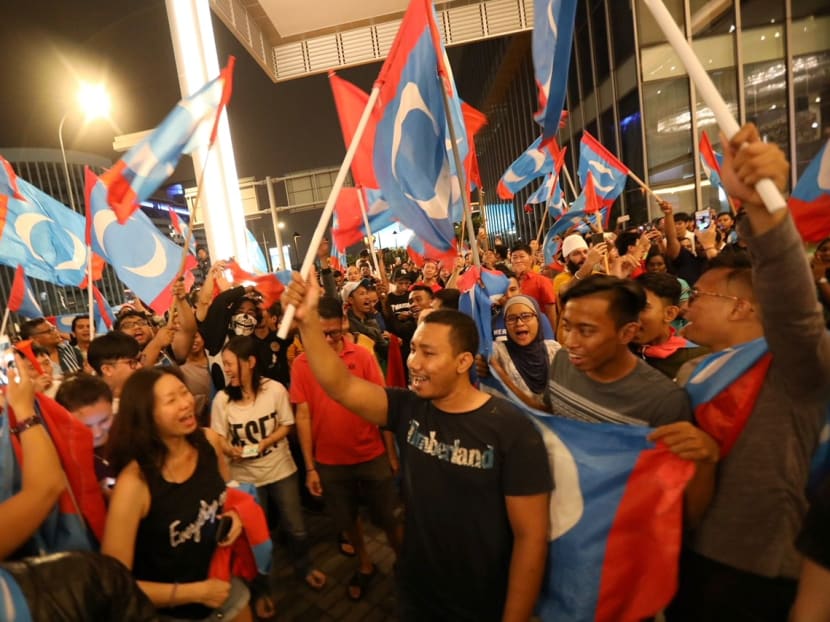What effect did social media have on the Malaysian election result?
Barisan Nasional’s (BN) historic loss in the 14th Malaysian General Election (GE14) at the hands of Pakatan Harapan (PH), ending its 61-year rule, was a battle lost on various fronts— social media included.
Barisan Nasional’s (BN) historic loss in the 14th Malaysian General Election (GE14) at the hands of Pakatan Harapan (PH), ending its 61-year rule, was a battle lost on various fronts— social media included.
Objectively, BN’s social media game has improved on many accounts.
Compared to GE12 and GE13, BN’s social media machinery established far savvier campaigns featuring viral videos, influencers, and trending slogans like #Negarakru (a play on Negaraku) and #HebatkanNegaraku (Make My Country Great).
Yet this proved insufficient to convince enough citizens to vote in its favour for several reasons.
First, sophisticated as BN’s public relations campaigns may be, healing the tarnished image of its leader, former Prime Minister Najib Razak, and BN by association, was an uphill battle.
The 1MDB scandal erupted in 2015, but its implications have rippled throughout the election.
PH linked 1MDB to cost of living issues and corruption in its social media campaign messages, mobilising grassroots support for good governance.
The Internet has allowed for increased transparency by making it easier for citizens to perform fact-checks and background-checks, facilitating higher involvement in civic issues.
This provided more space for dissent and competing narratives, leading to a further distrust in authority.
These trends made it especially challenging for the Najib administration, and the BN camp by extension, to convince voters of their governance record.
This is especially the case in an era where Malaysians increasingly consume news via private social media platforms like WhatsApp that unlike traditional media, are not government-controlled.
The fact that news sent via WhatsApp usually comes from trusted family and friends made it even more difficult for the Najib administration to control the official narrative, despite the BN camp labelling anything negative “fake news”.
Second, while PH’s social media lead was relatively diminished in this electoral cycle, it had already established a strong online presence in previous elections.
This likely influenced younger and first-time voters in GE14, as they would be familiar with PH based on its previous popular campaigns like #IniKalilah (This is the Time) and #Ubah (Change) that have taken root in Malaysian society over the years.
Crucially, 41 per cent of the almost 15 million voters were aged 21-39.
Plus, despite a smaller election machinery, mass mobilisation via the Internet enabled PH to draw large crowds to their ad hoc campaign rallies across the country (or alternatively, to their Facebook live streaming videos), potentially swaying fence-sitters and consolidating votes amongst its supporters.
Third, though BN’s campaign content had glitz, glamour and high-quality production, it failed to connect with the people on an emotional level and was unable to compete with PH’s approach that better engaged voters.
Campaign content appeared more sincere on PH’s end. For instance, the campaign video showing Dr Mahathir Mohamad talking to a little girl about saving the country resonated with many.
PH’s videos showing, for example, the strenuous commute of working-class Malaysians employed in Singapore through a day in the life of the family of young PH candidate Syed Saddiq also demonstrated sensitivity to voters’ socioeconomic grievances.
Conversely, BN campaigns failed to address the wildly unpopular Goods and Services Tax (GST) and cost of living issues, which were key drivers of the Malay tsunami that propelled PH to victory.
Instead, BN hyped up the economy by showing government-linked companies’ CEOs promoting the pact’s economic track record via the Hebat Negaraku song, along with videos of pro-GST citizens and AirAsia CEO Tony Fernandes’ crediting his company’s success to the Najib administration.
All these gave the general impression that BN was deaf to the people, or at least wilfully ignorant of how existing GDP growth was not trickling down to the laymen.
This focus on past achievements was unappealing— if not irrelevant— to the wired youths whose concerns for the country are grounded in the future.
As such, PH gained momentum amongst the youth and angry voters through its manifesto and campaign strategies, both of which reflected a vehement spirit for reform.
Collectively, these missteps and disadvantages in social media exacerbated BN’s poor electoral performance, especially when coupled with inadequate traditional strategies.
At the state level in Kelantan and Terengganu, for instance, stiffer opposition and BN’s reluctance to utilise large-scale ceramahs disconnected it from rural voters.
With 28 years of experience as Kelantan’s opposition ruling party under its belt, PAS was able to navigate different demographics and address the problems deemed important by the locals including the rising cost of living caused by GST, disaster management and costly student loans.
The victory of PAS in both states without massive social media campaigning highlights how the “personal touch” as embodied in ceramahs and other face-to-face campaigns are still effective for certain areas.
Internet-based campaigns hence complement, rather than substitute, traditional campaign methods in GE14.
Ultimately, what mattered more was whether political parties were capable of registering the currents of change percolating within an evolving Malaysian society and addressing these voter grievances accordingly— something that BN, with social media or not, did not do.
ABOUT THE AUTHORS:
Najwa Abdullah is a Research Analyst with the Malaysia Programme at the S. Rajaratnam School of International Studies (RSIS), Nanyang Technological University. Amalina Anuar is a Research Assistant in the same programme. This is part of a series of commentaries by RSIS on the 14th Malaysian General Election.










